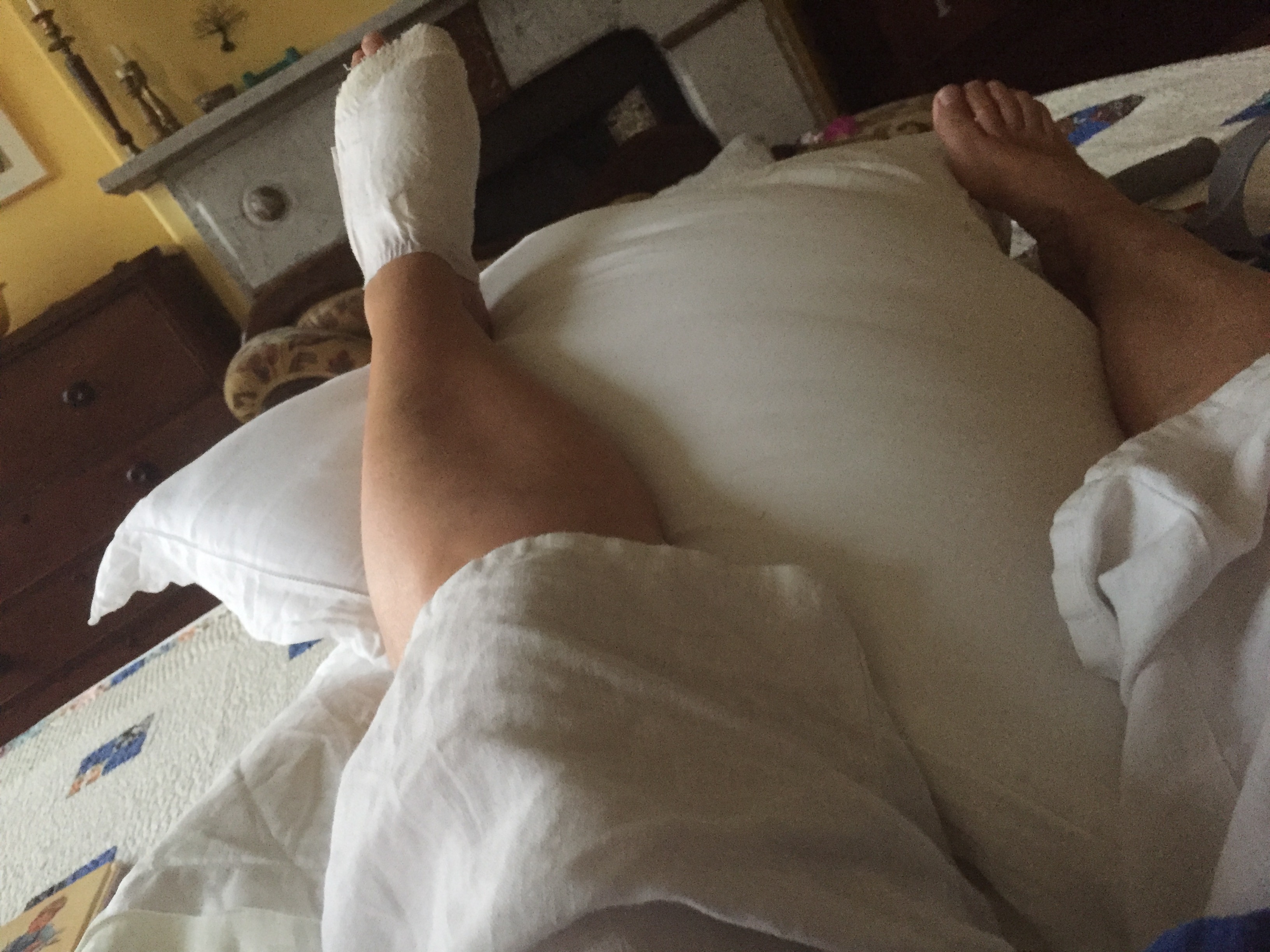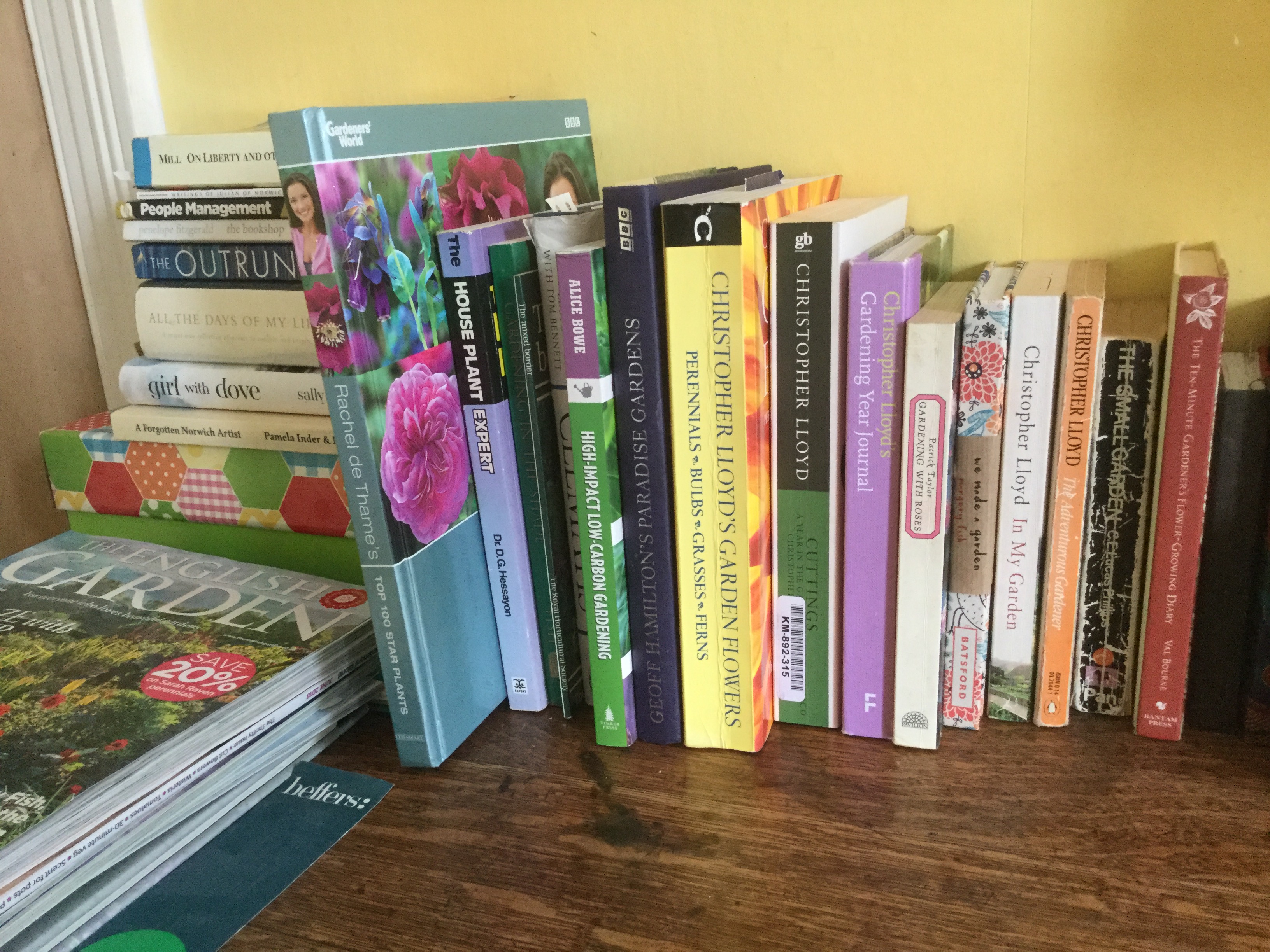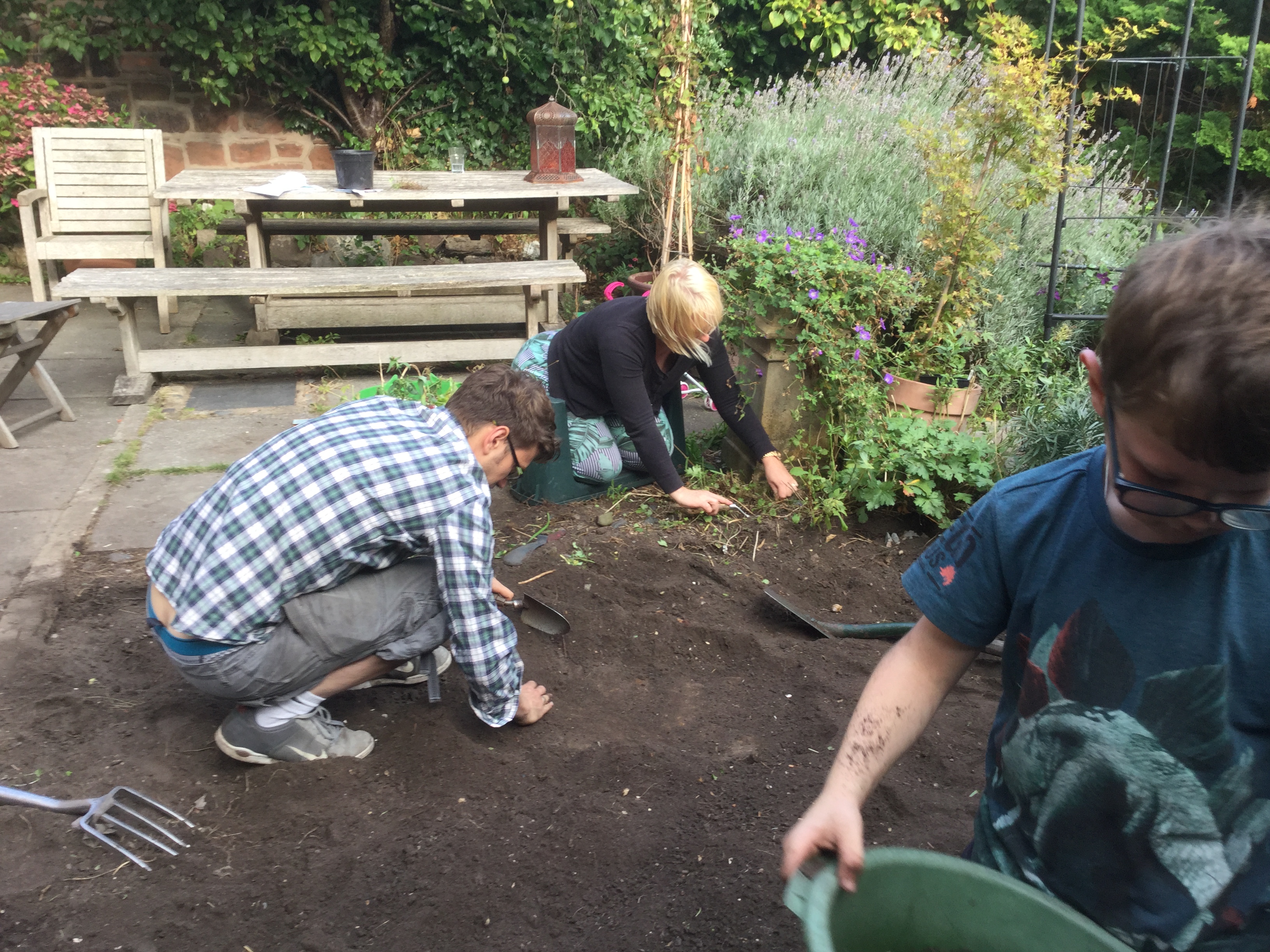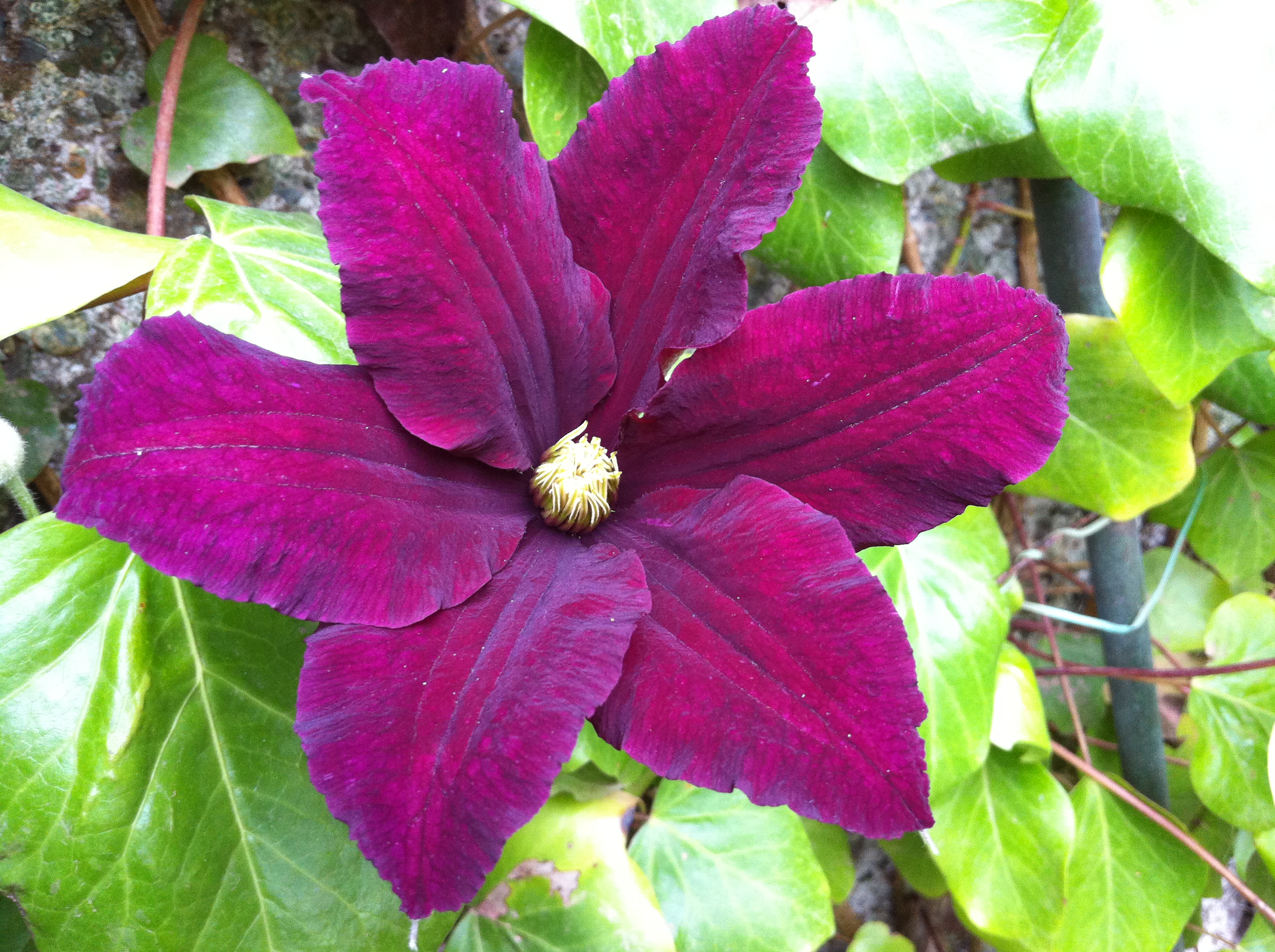
I had an operation on my foot on the 7th August and on the same day my son and daughter-in-law and their two children temporarily moved in with us while builders were undertaking work in their new house. ‘Temporarily’ turned out to be seven weeks. I’d been laid up in bed post-op, learned to walk around the house using crutches, achieved a walk up our road, become more-or-less mobile, got used to driving an automatic hire car (no need for your left foot) and finally was pretty much recovered by the time they moved out. High summer had become late autumn.
Though I was glad of both, that surgery and my son’s family interrupted whatever rhythms I’d had in the previous chunk of time, and during August and September my writing came to an end. The room I write in was piled high and wide with their household stuff, and crutches or no, I literally couldn’t get to my desk.
But it is not about the room. You can write anywhere, and finding flow is easy, even hard to avoid, when the impetus is strong. When I had small children of my own I would wake up early – four, five a.m. to find uninterrupted time for writing. But now it wasn’t only the clear, solitary hour I needed (and could have made for myself), but something to do with a feeling of mental space, with a need for cumulative rhythm which would bring about or allow impetus to emerge. Perhaps because of the surgery as much as the grandchildren, I couldn’t find that space, that rhythm. And perhaps something else was happening during that downtime.
The period of recovery began with me in my bedroom, reading gardening books and being visited through the day by my temporary-resident grandchildren. They were a companionable joy with their conversations and games and stories. Then they would go off to find something more lively than me and I’d pick up my gardening book again. I say ‘reading gardening books’ as if that were a simple matter but as I think back to the first week after the surgery, on my bed with my foot raised on cushions in warm, light-washed August, I realise that ‘reading gardening books’ was a period of imaginative messing about, like the grandchildren painting or making worlds with bits of Lego or dolls in the real garden. I was mentally playing ‘gardening’.

Reading, with great attention, lists of Rachel de Thame’s favourite fifty plants, searching through my favourite specialist nursery online catalogues, I was imagining possible gardens or parts of possible gardens I might make, at some point, when not out of action and able to walk about and get down on my hands and knees with a trowel. (I’d forgotten the restriction going to work would place, has for years placed, on my gardening time, creative energy, impetus).
Short periods of concentration allowed me to enjoy short pieces of writing – stories by Nic Pizzolatto and Denis Johnson. But I didn’t seem to want fiction in the way I wanted garden writing. Was this to do with having acres of time, and it being good weather yet me being unable to get out there and do anything?
Christopher Lloyd is my favourite garden writer and I turned to him for comfort and distraction, re-reading my way through old favourites Cuttings, Garden Flowers, and Clematis. This last was one of the first gardening books I ever bought and I remember how the sense of possible obsession got to me when reading it. Yes, he openly confessed it, and I saw it was happening to me. I was beginning to adore clematis (though have struggled to grow many of them in my West Kirby sand) in the same way I had, as a beginner gardener, adored Hardy Geraniums. Am currently mildly obsessed by Euphorbias. Later, or if I ever garden on different soil, I will also adore and be obsessed by roses in exactly the same way. When I look at Rose Catalogues, I can feel that love ahead, calling to me.
What I call ‘gardening’ is more to do with such tidal obsessions, which seem to come down to the desire to note difference. A garden is whole thing, like a novel or a painting, but my gardening is more like someone collecting, and sometimes mixing, shades of paint. Happy, enchanted actually, to look at them in the paintbox. On the palette. Not painting very much. I realised early last summer when staying in an Airbnb in Stavanger that Heinrich, mine host there, had a garden. It’s a whole whole. He’s still fiddling with it but it is undoubtedly complete. Mine is not like that. I never get a finished completion, though I did once, perhaps only for a season, in the front garden, before The Reader had become the all-consuming creative love of my life. Nowadays, being unable to make time (or concentrated energy) to garden, I – so good at cutting my losses – almost don’t care about that wholeness.

What interests me most is individual plants, sometimes in combinations. I can’t get much bigger than that. And this feels – yes, this is odd – as if it may be an act of prayer or is the right word observance. I look the word up in the online etymological dictionary, which gives me a good distinction between observing and being observant.
early 13c., “act performed in accordance with prescribed usage,” especially a religious or ceremonial one, from Old French observance, osservance “observance, discipline,” or directly from Latin observantia “act of keeping customs, attention, respect, regard, reverence,” from observantem(nominative observans), present participle of observare “watch over, note, heed, look to, attend to, guard, regard, comply with,” from ob “in front of, before” (see ob-) + servare “to watch, keep safe,” from PIE root *ser- (1) “to protect.” Observance is the attending to and carrying out of a duty or rule. Observation is watching, noticing.
Observance would be the finding ten minutes a day to get out there and do something, the garden equivalent of daily prayer or meditation. Which I don’t manage, or choose to find, so I’m not observant. Yet I do love observing, watching, noticing some plants. Because I can do that with without rhythm, it’s a one-off, which I do whenever I can. This is gardening determined by no long- time rhythm.

The opposite of this would be the life of a professional, vocational plantsman or woman, a Christopher Lloyd. Read his In My Garden. Or to turn to a book I am currently reading, try this one by Clare Leighton. One of the finest engravers of the C20, she was also a gardener and her lovely book, Four Hedges (Little Toller Books), is giving me much to think about.
This morning, just after I had been writing and thinking about rhythms, I read,
From Aunt Sarah I learned the rhythm of the garden’s year. In her garden I performed those annual rituals that are necessary for happiness. I remember them as they followed upon each other through the months: I saw the first snowdrop, and plucked the first primrose. I heard the cuckoo for the first time. I listened for nightingales on May evenings. I picked a strawberry warm in the sun and climbed a ladder to gather Aunt Sarah’s apples for her. The lesser rituals would be spaced between these: watching for the first Christmas roses, the annual journey to the fritillary fields to pluck these evil, unEnglish looking flowers; the finding of bird’s nests in the coppice. It is through rituals such as these that one belongs to the earth.
‘May’ Four Hedges
I had a mainly country childhood, my grandparents knew and taught me: cuckoo-spit, lords and ladies, cleavers, goose-grass, rose-hips, blackberrying, and northern weather lore such as ‘ne’er cast a clout ‘til May is out’. I thought May meant hawthorne blossom (‘don’t bring it in the house!’ Nan would cry when I picked it) and now realise it means the month of May. Reading Clare Leighton I have been thinking of children who do not have the experience of any outdoor life or rhythm and what means for their sense of belonging. ‘It is through rituals such as these that one belongs to the earth’.
I’m also currently reading All The Little Live Things, a novel by Wallace Stegner, an American author I’ve not heard much about in the UK. This is a novel set in the 1960 or early seventies, when people like me were dropping out and tuning in. It’s a novel which has Paradise Lost in the background and asks some of the same questions: if this is nature, how did evil get in? What kind of God creates cancer? I haven’t finished it yet, so will hold my peace. But if you are looking for something chunky to read in the New Year, try one of his two great novels, Crossing to Safety and Angle of Repose, both highly recommended.
Back to time off. I had a long period of downtime. Looking back it feels like something else may have been going on during that time – something out of sight, underground. Let’s see what the spring brings.
Opening stanzas from ‘The Flower’, by George Herbert
How fresh, O Lord, how sweet and clean
Are thy returns! ev’n as the flowers in spring;
To which, besides their own demean,
The late-past frosts tributes of pleasure bring.
Grief melts away
Like snow in May,
As if there were no such cold thing.
Who would have thought my shrivel’d heart
Could have recover’d greennesse? It was gone
Quite under ground; as flowers depart
To see their mother-root, when they have blown;
Where they together
All the hard weather,
Dead to the world, keep house unknown.
Loved reading this I am a gardener, and have pondered this notion of wholeness. I also paint water-colours, so was aware that I was sculpting, clumping about, creating something still to be known or understood, but still the colours and textures merged in wondrous ways. I love the poem too. It really struck a chord.
Missed reading Jane Davis’ regular blogs and comments on what she’s reading. Very happy to find her back on her blog and I wish her a speedy recovery. I’ve never been much of a gardner, but now have a little Rosemary plant in a pot on my indoor window sill. (the outside one is too narrow). I planted a few short twigs myself and now I check them every day, hardly believing they’re actually growing. Somehow they make me feel so grateful and I can identify with the poet’s emotions.